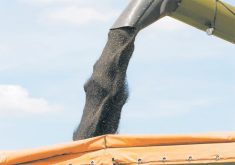As they say, truth is stranger than fiction. A fictional story has to make sense. The real-life regulatory case of the insecticide lambda-cyhalothrin defies logic.
This is the active ingredient in Syngenta Canada’s Matador as well as Adama Canada’s Silencer. It’s also in a lesser-known product called Labamba by Sharda Cropchem Limited.
Lambda-cyhalothrin has long been a mainstay for insect control in crops, particularly for flea beetles and grasshoppers.
The Pest Management Regulatory Agency regularly reviews product registrations and somehow in the case of lambda-cyhalothrin it concluded it would remain approved on crops for human consumption, but would no longer be allowed on crops fed to livestock.
Read Also

Downturn in grain farm economics threatens to be long term
We might look back at this fall as the turning point in grain farm economics — the point where making money became really difficult.
Seems pretty strange, eh? Safe for humans, but not safe for livestock. South of the border, the Environmental Protection Agency also reviewed the insecticide, including a new study the PMRA refused to consider, and concluded that lambda was safe for crops fed to humans as well as livestock.
Syngenta and Adama no doubt struggled with how they should proceed in the Canadian market. Last fall, they pulled their product from farm retail outlets knowing at the very least it would need to be re-labelled. Labamba was not pulled from retailers and farmers bought up the supply to hedge their bets.
With the PMRA’s weird ruling, all sorts of high-level scientific discussions have occurred behind the scenes. Adama recently decided that it would put re-labelled Silencer back on the market.
On the surface, using the insecticide may not seem like a problem. You just have to use it on crops going for human consumption. Not as simple as it sounds. Barley intended for malting often ends up as feed. Canola oil is for humans, but the meal is for animals. Crops get cleaned with the screenings fed to livestock.
It’s hard to believe that a canola crop sprayed in the early spring for flea beetles would have any residue of the insecticide in the seed, but lest you decide to just ignore the label, the Western Grain Elevator Association, which includes all the major grain companies, says it will require in its declaration from growers that no unregistered products were used.
Another complication is imports of grain from the United States. Large amounts of American corn flow into feedlot alley in southern Alberta. How will anyone know if lambda was used on that corn? Will this prevent corn imports? That seems hard to believe, but the whole issue is hard to believe.
Incredibly, the corn could be imported and fed to people and there would be no violation.
Yes, crop protection products must be scrutinized regularly and as concerns arise. Yes, we should always err on the side of safety, but common sense should also be part of the equation.
The PMRA no doubt has some brilliant scientists, but someone in the agency needs to give their head a shake. If there’s a plausible explanation why something is safe for humans, but not safe for livestock, let’s hear it.
Another important insecticide, chlorpyrifos, with trade names that include Lorsban, Pyrinex and Nufos, is no longer for sale and this is the last year it can be used. If good reasons exist to de-register products, we need to live with it. With lambda, people working on the file believe an understaffed PMRA has made a bad decision with wide-ranging ramifications.
Kevin Hursh is an agricultural journalist, consultant and farmer. He can be reached by e-mail at kevin@hursh.ca.


















